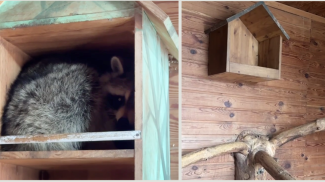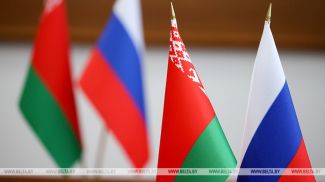MINSK, 29 November (BelTA) – Ten new plaques with names of righteous people were installed in the Righteous Among the Nations Avenue in the Pit Memorial in Minsk on 29 November. Ten trees bearing their names were also planted in their honor, BelTA has learned.
The Righteous Among the Nations Avenue was created in the Pit Memorial in Minsk in the late 1990s upon the initiative of former Minsk ghetto prisoners when the first few trees were planted and plaques with names of righteous people were installed. Names of another ten people and families, who saved Jews during the Holocaust, were added to this commemorative list on 29 November.
During the ceremony Ambassador Extraordinary and Plenipotentiary of Israel to Belarus Alex Goldman Shayman said: “It is important to remember victims but it is also important to remember their saviors. Important to remember the soldiers, who liberated concentration camps. Important to remember the righteous, who demonstrated bravery and kindness. Important to tell our children and grandchildren about them.” He also noted that it is symbolical that these plaques were unveiled when Israel and all the Jewish communities celebrate the first day of Hanukkah. “We light the second candle. Hanukkah is a celebration of the victory of light over darkness. And the righteous among the nations have become the rays of light in the darkness of the Holocaust that allowed people not to forget that darkness will not last forever and that there is hope,” the ambassador added. Besides, the United Nations Organization decided in favor of establishing the State of Israel on 29 November 1947.
The world holocaust remembrance center Yad Vashem is in Israel. Via Yad Vashem the State of Israel and the entire Jewish nation thank all the non-Jews, who saved Jews during the Holocaust.
The title Righteous Among the Nations has become widely recognized and is now a synonym of honor, human heroism, and signifies victory of the good over the forces of evil. The words “Those who save one life have saved the entire world” are engraved on the medals the righteous receive.
The recognized righteous among the nations include natives of 44 countries: Christian believers and Muslims, believers and atheists, men and women, people of various professions and ages, educated and non-educated, rich and poor people. The only thing that unites them is humanity and bravery, the desire to preserve the best moral qualities in the face of grim terror.
Over 110,000 prisoners were kept in the Minsk ghetto from July 1941 and through October 1943. The ghetto represented several streets cordoned off by barbed wire in Minsk. There were over 200 large and small ghettos across Belarus back then. Some of the prisoners managed to escape, including thanks to the bravery of bold and merciful people, neighbors who saved doomed prisoners, hid them, transported them, gave them food and clothes, support and hope. According to the world holocaust remembrance center Yad Vashem, 676 people in Belarus have been recognized righteous among the nations so far. “Thus, the number of descendants of the Jews Belarusians have saved is several thousand people, several thousand saved worlds and hearts, who beat today thanks to the heroic deeds of the righteous,” Chairman of the Union of Belarusian and Jewish Public Associations and Communities Oleg Rogatnikov stressed.
Deputy Head of the Central Office for Multilateral Diplomacy of the Belarusian Ministry of Foreign Affairs Aleksandr Opimakh added that it is likely that the list of the righteous is not complete. “We are still learning about some new names. We are unlikely to learn some of them ever,” he said. “But we are grateful to all these selfless people.”
Commissioner for Religious and Ethnic Affairs of Belarus Aleksandr Rumak noted that the Nazi had many sophisticated forms of genocide but they still “could not kill the best qualities of Belarusian people (humanity, mercy, compassion), which were manifested even in dangerous conditions”. “These qualities evolved over many centuries. People of many nationalities and confessions lived and live in this land,” the official said. “We would like to preserve interreligious, interethnic peace that exists in our land.”
Galina Levina, Chairwoman of the Board of the public organization Republican Fund Holocaust, a daughter of the architect Leonid Levin, who added the sculptural composition “The last road” to the Pit Memorial in 2000, came up with a heartfelt analogy. She reminded that there are open wicket gates in positions of burned-down houses in the Belarusian WW2 memorial complex Khatyn. Among other things they symbolize open doors at the moment of truth when people face a choice and risk their lives to commit a humanistic deed of the highest caliber.
Galina Levina also shared plans to create a wall with names of righteous among the nations in the Pit Memorial. The Minsk City Executive Committee supports the initiative. Minsk Deputy Mayor Artyom Tsuran assured he is ready to continue cooperation for the sake of preserving memory of the courageous people, whose names are written in golden letters into the history of Minsk, Belarus, and many other countries.
All the participants of the event said they hoped that this commemorative avenue would become a place where young people and Minsk city visitors study the history of the war in Belarus' territory. It will tell dramatic stories of rescues and wonders created by people themselves.
Some of those people are still alive. The righteous man Viktor Cherny and his daughter Valentina were present during the unveiling of the commemorative plaque immortalizing a brother and two sisters of the Cherny family. During WW2 Viktor Cherny's father was shot and three children – a 15-year-old Viktor, a 16-year-old Anna, and a 10-year-old Valentina – continued living alone at an isolated farmstead on the side of their village. Maria and her 10-year-old daughter Raya happened to come to the farmstead in 1941 after an air strike killed Maria's husband and two little kids in Borisov. They initially came to a friendly family in the same village but that family was poor and had no beds to spare for the refugees. Maria and Raya spent the night on the floor and went to find another shelter the next day. Viktor Cherny recalled what they felt back then: “It was very frightening. There were various people around. Some could have easily tipped off the authorities.” He was nearly driven to work in Germany three times but his elder sister and his own ingenuity helped him out in a tight spot. None of the villagers snitched on the Cherny family. The saviors and the saved still keep in touch even after Raya and her family moved to Israel.
Similar stories are behind the plaques with names of Fatima Kanapatskaya and her daughter Anna Trofimova; Tereza Vykhota; Ivan and Yekaterina Bovt and their son Ivan; Kirill and Anastasia Semashko and their daughter Raisa; Klementy and Olga Lisovskikh and their son Kim; Maria Yasinskaya and her sons Boris and Aleksandr; Maria Martsulyaniss; Valentina and Yelena Tikhanovich; Pelageya Shashok.













